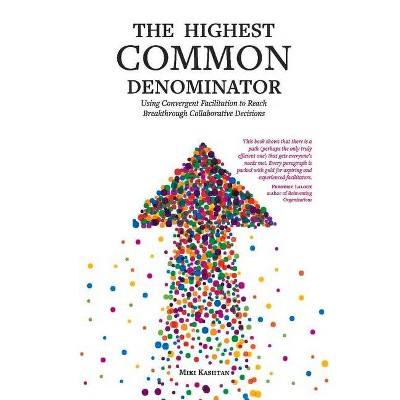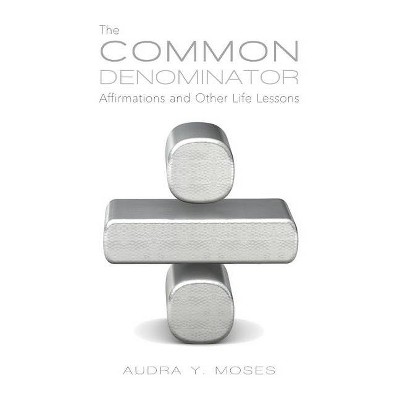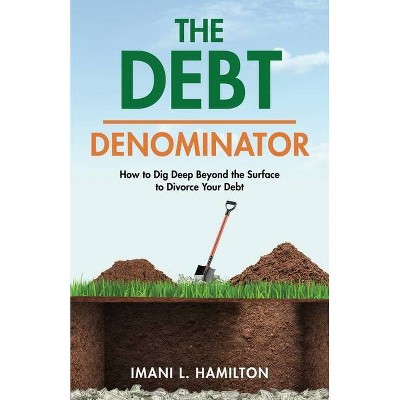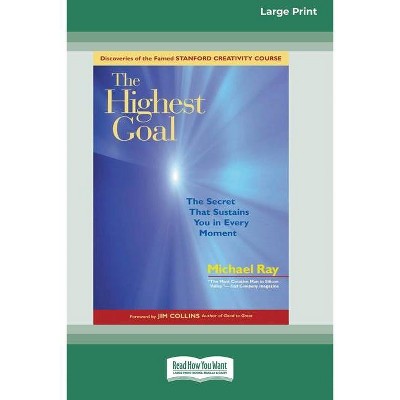The Highest Common Denominator - by Miki Kashtan (Paperback)

Similar Products
Products of same category from the store
AllProduct info
<p/><br></br><p><b> About the Book </b></p></br></br>What if people -- even longtime enemies -- could transform conflicts into creative dilemmas they feel motivated to solve together? What if employees could leave a meeting empowered and with a joint sense of purpose? <p/>In THE HIGHEST COMMON DENOMINATOR: Using Convergent Facilitation to Reach Breakthrough Collaborative Decisions, Miki Kashtan introduces a novel decision-making process called Convergent Facilitation that builds trust from the beginning, surfaces concerns and addresses them, and turns conflicts into creative dilemmas that groups feel energized to solve together. This highly effective process has been used successfully around the world to resolve problems and teach people how to collaborate without sacrificing productivity. <p/>Since 2002, Convergent Facilitation has helped organizations, businesses, and governments upend traditional and unproductive decision-making methods, such as majority rule, top-down decision-making, or consensus, which can drain a group's energy. In 2012, Miki worked with the Minnesota State Legislature to resolve gridlock on child custody legislation and helped stakeholders draft bills that passed nearly unanimously. In a 2014 op-ed in the New York Times, Miki explained how power differences lead employees to stay silent and not feel part of a common goal, which ultimately makes a business run less effectively. <p/>THE HIGHEST COMMON DENOMINATOR moves through three phases of a process that brings groups to outcomes that are profoundly collaborative and genuinely supported by all. Through vivid case studies and practical examples, the book explains: <br>- how to guide people towards solutions that integrate everyone's needs and concerns without requiring compromise;<br>- how to keep people on track with the task at hand;<br>- how to invite dissent and engage with it productively; and<br>- how to attend to the power differences that so often interfere with collaboration.<p/><br></br><p><b> Book Synopsis </b></p></br></br>What if people -- even longtime enemies -- could transform conflicts into creative dilemmas they feel motivated to solve together in an atmosphere that builds connection and trust? What if employees could leave a meeting empowered and with a joint sense of purpose? What if the positive changes community activists are working so hard to see in the world could have a lasting impact? <p/>The traditional ways we make decisions are flawed. Majority rule, top-down orders, compromise, and consensus lead to people feeling disconnected, drained of energy, and unsatisfied. THE HIGHEST COMMON DENOMINATOR: Using Convergent Facilitation to Reach Breakthrough Collaborative Decisions presents a better way to make decisions using Convergent Facilitation, the method Miki developed after years of working with groups in a variety of settings. Miki posits that collaborative decision-making, where people feel heard and their needs respected in a structured and trusting environment, maximizes willingness and efficiency for all. This can lay the ground for breakthroughs for groups working on challenges, allowing decisions to be made at lightning speed. The process includes three phases that can bring groups to outcomes that are profoundly collaborative and genuinely supported by all. <p/>THE HIGHEST COMMON DENOMINATOR gives readers examples, tools, and processes to implement Convergent Facilitation. It includes vivid case studies and practical examples to explain how to guide people towards solutions that integrate everyone's needs and concerns and don't require compromise; provides tips on how to keep people on track with the task at hand; and encourages facilitators to invite dissent and engage with it productively. <p/>One case study explores the revision of child custody laws in Minnesota. Lawmakers had been struggling for years to write new legislation that would satisfy stakeholders. When Miki began working with them, many regarded each other with deep mistrust and believed no new laws could be created. The process ended with the creation of legislation that was passed near-unanimously by the state legislature. One of the participants later described it as a transformative experience. <p/>In workplace settings, Miki explores how companies can truly achieve a collaborative culture, where employees feel heard and are motivated. Stuart Thorn, retired President and CEO of the Southwire Company, wanted to achieve a truly collaborative culture for his multi-billion-dollar company, all the while he was experiencing friction between division managers and leadership. After bringing Miki in personally to bring his own team toward convergence, he reflects that after reading THE HIGHEST COMMON DENOMINATOR, I can see that her ability to draw out insights about the inner workings of organizations is not effortless at all, but rather based on a very conscious, thoughtful, and deliberate approach carefully developed over many years of practice and experimentation. This is good news. It means that Miki's skills are transferable. <p/>The procedures described in this book can be used in any kind of setting--from grassroots social change movements to village councils to corporate boardrooms--where people are having trouble collaborating effectively in a group, which is almost everywhere. With the mounting social, political, and environmental problems of our times, harnessing a group's energy for effective action is essential. And yet many people drift away from organizations they care about due to their inability to sit through meetings--where tensions may remain unresolved, power differences are not addressed, and solutions that work for all do not seem available. <p/>Ultimately, this book is not just about working with groups. It is an entire re-examination and affirmation of the human heart. Facilitation involves transparency on the part of the one leading it, as well as a deep faith and hope in how even impossible-seeming differences can transform into unity.<p/><br></br><p><b> About the Author </b></p></br></br>Miki Kashtan is a co-founder of Bay Area Nonviolent Communication. She is inspired by the role of visionary leadership in shaping a livable future, and works toward that vision by sharing the principles and practices of Nonviolent Communication (NVC) through mediation, meeting facilitation, consulting, and training for organizations and for committed individuals. Convergent Facilitation is the process she created to apply Nonviolent Communication principles to multi-stakeholder group decision-making. She holds a Ph.D. in Sociology from the University of California-Berkeley, is the author of three books about the implementation of Nonviolent Communication, and speaks internationally about NVC practices.
Price History
Cheapest price in the interval: 20.49 on May 23, 2021
Most expensive price in the interval: 20.49 on November 8, 2021
Price Archive shows prices from various stores, lets you see history and find the cheapest. There is no actual sale on the website. For all support, inquiry and suggestion messagescommunication@pricearchive.us




















